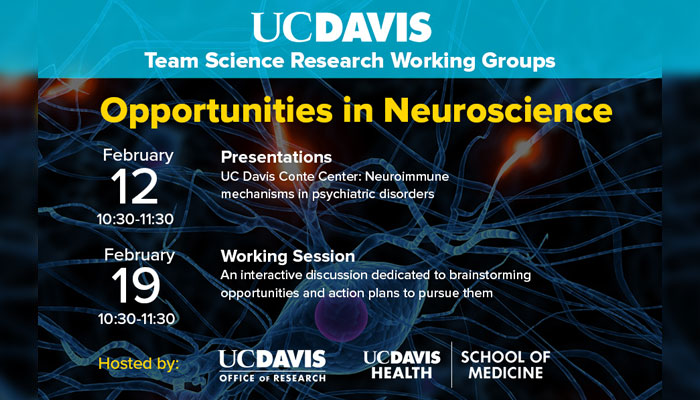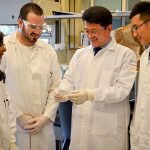Team Science: Opportunities in Neuroscience
February 12th, 10:30 AM – 11:30 AM: Presentations and Insights
UC Davis Conte Center: Neuroimmune mechanisms in psychiatric disorders
Mechanisms underlying the effects of maternal Infections on offspring risk for neurodevelopmental and psychiatric disorders
Zoom details:
https://zoom.us/j/805959373
Meeting ID: 805 959 373
Password: 901020
Presenters
 Cameron Carter
Cameron Carter
Principal Investigator for the Conte Center
Director, UC Davis Imaging Research Center
Professor of Psychiatry and Behavioral Sciences
 Kimberley McAllister
Kimberley McAllister
Director, UC Davis Center for Neuroscience
Professor of Neurology and Neurobiology, Physiology and Behavior
PI and Director of the NIMH-funded T32 for the UC Davis Learning, Memory and Plasticity Training Program
 Melissa Bauman
Melissa Bauman
Professor of Psychiatry and Behavioral Sciences and UC Davis MIND Institute
Director, UC Davis Women in Medicine and Health Sciences (WIMHS) Program
 Judy Van De Water
Judy Van De Water
Professor of Medicine, Division of Rheumatology/Allergy and Clinical Immunology
Associate Director Biological Sciences, UC Davis MIND Institute
Deputy Director, UC Davis MIND Institute IDDRC
Director, UC Davis NIEHS Center for Children’s Environmental Health
About the UC Davis Conte Center
Growing evidence from epidemiology, genetics and clinical neuroscience implicates neuroimmune mechanisms in the pathophysiology of schizophrenia (SZ) and other developmental psychiatric disorders. A new class of animal models of maternal immune activation (MIA), expressing developmentally phenotypic features related to SZ, has been developed; however, little is known about the mechanisms by which MIA results in changes to brain development, connectivity and behavior. The UC Davis Conte Center seeks to bridge that gap. Our interdisciplinary team of neuroscientists has worked together to develop hypotheses, design experiments and collect preliminary data to develop a unique set of closely integrated projects. The Center comprises an accomplished group of investigators from molecular and cell biology, systems and behavioral neuroscience, biomedical engineering, neuroimaging, and clinical neuroscience and a highly integrated set of studies conducted across species and scale to test the hypothesis that one important origin of schizophrenia is a dysregulation of immune molecules that play a key role in the normal development and functioning of connections in the brain. These changes are hypothesized to lead to altered structural and functional connectivity and eventually to the disturbances of cognition, perception and emotion that characterize schizophrenia. Across the Center projects, synaptic changes, gene expression, structural and functional connectivity, neural inflammation and behavior will be measured in unique animal models at multiple ages to determine the timing and hierarchy of the effects of MIA. When possible, parallel studies in humans will be conducted to establish the clinical relevance of the MIA animal models.
February 19th, 10:30 AM – 11:30 AM: Neuroscience Opportunities Working Session
This session will be an interactive discussion dedicated to brainstorming opportunities and action plans to pursue them.
Moderators
Ana Lucia Cordova
Strategic Initiatives Manager
Paul Dodd
Associate Vice Chancellor for Interdisciplinary Research and Strategic Initiatives
Zoom details:
https://zoom.us/j/805959373
Meeting ID: 805 959 373
Password: 901020




